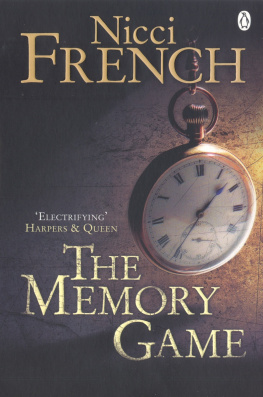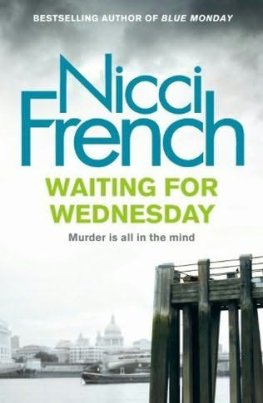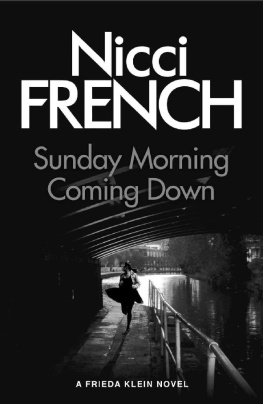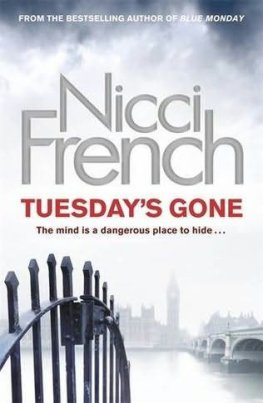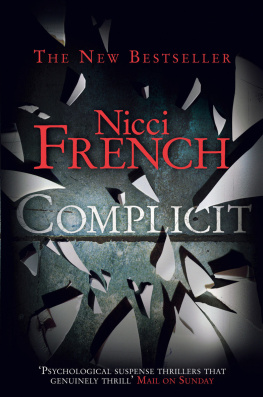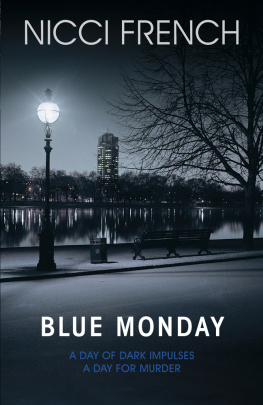Nicci French - The Memory Game
Here you can read online Nicci French - The Memory Game full text of the book (entire story) in english for free. Download pdf and epub, get meaning, cover and reviews about this ebook. year: 2008, publisher: Penguin Publishing, genre: Detective and thriller. Description of the work, (preface) as well as reviews are available. Best literature library LitArk.com created for fans of good reading and offers a wide selection of genres:
Romance novel
Science fiction
Adventure
Detective
Science
History
Home and family
Prose
Art
Politics
Computer
Non-fiction
Religion
Business
Children
Humor
Choose a favorite category and find really read worthwhile books. Enjoy immersion in the world of imagination, feel the emotions of the characters or learn something new for yourself, make an fascinating discovery.
- Book:The Memory Game
- Author:
- Publisher:Penguin Publishing
- Genre:
- Year:2008
- Rating:5 / 5
- Favourites:Add to favourites
- Your mark:
- 100
- 1
- 2
- 3
- 4
- 5
The Memory Game: summary, description and annotation
We offer to read an annotation, description, summary or preface (depends on what the author of the book "The Memory Game" wrote himself). If you haven't found the necessary information about the book — write in the comments, we will try to find it.
The Memory Game — read online for free the complete book (whole text) full work
Below is the text of the book, divided by pages. System saving the place of the last page read, allows you to conveniently read the book "The Memory Game" online for free, without having to search again every time where you left off. Put a bookmark, and you can go to the page where you finished reading at any time.
Font size:
Interval:
Bookmark:
Nicci French is the pseudonym for the writing partnership of journalists Nicci Gerrard and Sean French. The couple are married and live in Suffolk.
There are now ten bestselling novels by Nicci French: The Memory Game, The Safe House, Killing Me Softly, Beneath the Skin, The Red Room, Land of the Living, Secret Smile, Catch Me When I Fall, Losing You and Until Its Over (the new hardback, published in May 2008).
the recovered/false memory
controversy
Nicci Gerrard was born in June 1958 in Worcestershire. After graduating with a first class honours degree in English Literature from Oxford University, she began her first job, working with emotionally disturbed children in Sheffield.
In the early eighties she taught English Literature in Sheffield, London and Los Angeles, but moved into publishing in 1985 with the launch of Womens Review , a magazine for women on art, literature and female issues. In 1987 Nicci had a son, Edgar, followed by a daughter, Anna, but by the time she became acting literary editor at the New Statesman her marriage had ended. She moved to the Observer in 1990, where she was deputy literary editor for five years, and then a feature writer and executive editor. It was while she was at the New Statesman that she met Sean French.
Sean French was born in May 1959 in Bristol, to a British father and Swedish mother. He too studied English Literature at Oxford University at the same time as Nicci, also graduating with a first class degree, but their paths didnt cross until 1990. In 1981 he won Vogue magazines Writing Talent Contest, and from 1981 to 1986 he was their theatre critic. During that time he also worked at the Sunday Times as their deputy literary editor and television critic, and was the film critic for Marie Claire and deputy editor of New Society.
Sean and Nicci were married in Hackney in October 1990. Their daughters, Hadley and Molly, were born in 1991 and 1993.
By the mid nineties Sean had had two novels published, The Imaginary Monkey and The Dreamer of Dreams , as well as numerous non-fiction books, including biographies of Jane Fonda and Brigitte Bardot.
In 1995 Nicci and Sean began work on their first joint novel and adopted the pseudonym of Nicci French. The novel, The Memory Game , was published to great acclaim in 1997. The Safe House, Killing Me Softly, Beneath the Skin, The Red Room, Land of the Living, Secret Smile, Catch Me When I Fall, Losing You and Until Its Over have since been added to the Nicci French CV. The Safe House, Beneath the Skin and Secret Smile have all been adapted for TV, and Killing Me Softly for the big screen.
But Nicci and Sean also continue to write separately. Nicci still works as a journalist for the Observer , covering high-profile trials including those of Fred and Rose West, and Ian Huntley and Maxine Carr. Her novels Things We Knew Were True, Solace and The Moment You Were Gone are also published by Penguin. Seans novel Start From Here came out in spring 2004.
This was your first book as a team. Why did you decide to write together?
Nicci: Its hard to say now (hard to remember) how something that for a long time had been a vague and slightly mad idea became a reality. Because when we met we were already writers and obsessive readers we had talked about what made a voice in a book, and wondered whether it would be possible for two people to create one, seamless voice. We used to say that one day, when we had time, we would try to write a book together, to see if it was possible. And then one day when we had no time, no money, four tiny children, a life of clutter and chaos we came across this idea for a book that seemed new and exciting. And we just thought that if we were ever going to do it, now was the time. It began almost like a literary experiment, and then quite soon it took us over.
So how did you actually go about it?
Sean: We spent weeks and months around the kitchen table with glasses of wine and gin and tonics sketching out the story and even, in the case of The Memory Game , drawing a detailed map of the Martello property. But when it came to writing the book, we wrote separately. One of us would write a section, then hand it to the other who was permitted in theory, at least to cut, add, rewrite without fear of retribution.
Nicci: It sounds simpler than it is, less messy and quarrelsome. Were often asked if we argue and the answer is that of course we do. We argue quite a lot (actually, I argue and Sean doesnt, which is extremely irritating). But its not over the things youd expect not over large ideas, or over the changing of words. Its more like a version of marital bickering: couples rarely argue over big issues, but over things like who does the washing up. More than arguing, however, we struggle and disagree with each other, and Ive come to think that our novels are born out of those disagreements: we often want to write about the things we cant quite settle on, the things that bother and disquiet us and we cant let go of, but come back to over and again.
We thought, after The Memory Game , that wed found a way of doing it, but that turned out to be nonsense. Maybe writing can never be easy and maybe it never should be. There are days when things go right, and then theres a kind of magic about the way that writing leads you, and you follow it in order to find out what you are thinking and then there are days when its painful and slow and your head feels like glue. We have very few rules together. One is that we never tell anyone not even our family, not our children who are always asking, who wrote which bit (people try and guess and theyre right about fifty per cent of the time). The other is that well change each others words privately, not face to face, otherwise its brutal.
Did you decide in advance who would write which bit for instance, who would write about recovered memory and the therapy sessions?
Nicci: Absolutely not. We both do all the research (in this novel, and in all the subsequent ones), and then whoevers turn it is to write will do so. Its imperative that we each own every bit of the book every piece of research, every word thats written.
Why did you choose the name Nicci French?
Sean: We were always felt the book should be published under a single name. We felt that two names on the cover are a distraction when you read fiction, you want to hear a single voice talking to you. The Memory Game had a female narrator, so it seemed natural to choose a female name. We played around with lots of possibilities but in the end we just gave up and contributed a name each. The only other name I remember, which we quite liked and everybody else hated, was Alice London. As a private joke, we reversed one of the ns and made Alice Loudon the heroine of our third book, Killing Me Softly.
Theres a lot in The Memory Game about families is any of that autobiographical?
Sean: Since this is a family history featuring crimes varying from murder to incest and culminating in two prison sentences, we were rather alarmed that our families claimed to recognize themselves in the book.
Nicci: When our families first read it, Seans thought it was based on them and on his crowded summers in Sweden with all his cousins, and my family thought it was based on them. Both of them, for instance, recognised the mushroom hunt at the start of the novel because both Sean and I had experienced that. Part of the impulse behind the novel was our shared sense that every close, happy family is also unhappy and full of secrets, and that memory is unreliable, slippery and seductive. The past is a shadowy country; you can get lost there.
Font size:
Interval:
Bookmark:
Similar books «The Memory Game»
Look at similar books to The Memory Game. We have selected literature similar in name and meaning in the hope of providing readers with more options to find new, interesting, not yet read works.
Discussion, reviews of the book The Memory Game and just readers' own opinions. Leave your comments, write what you think about the work, its meaning or the main characters. Specify what exactly you liked and what you didn't like, and why you think so.

